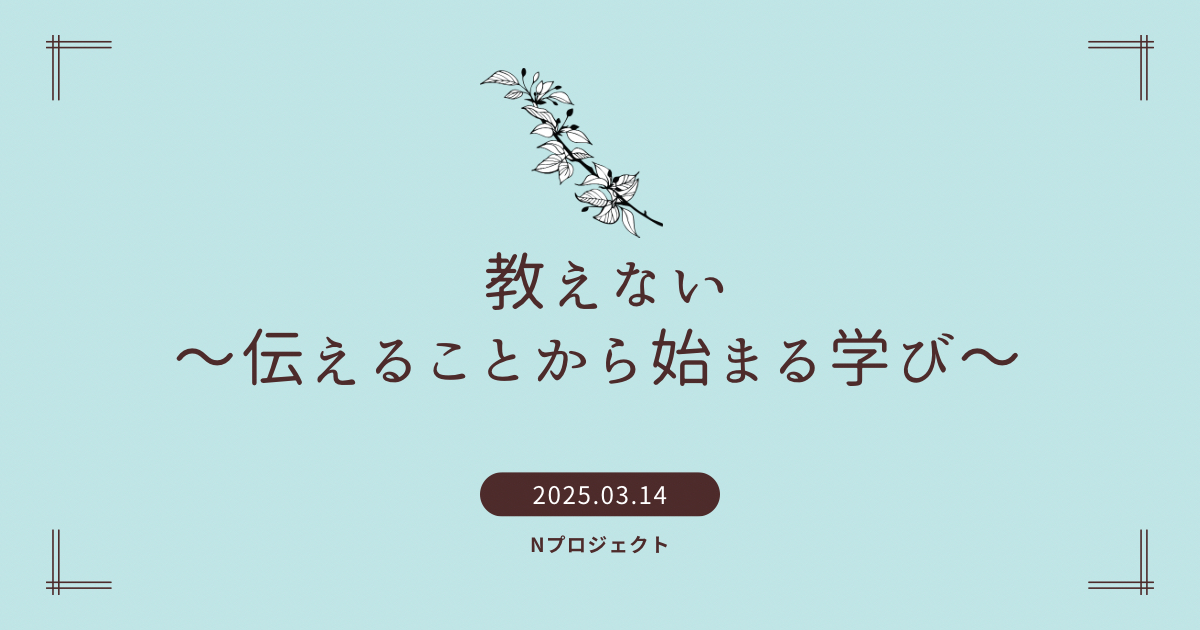知る・学ぶ
人は、学び続ける。私は大学を卒業したら、学ぶことは終わると思っていた。いやいや、大学を卒業してからが「本当の意味」での【学び】がスタートした。
大学までは「勉強」していたのかな。社会に出てからは、自ら学ぶことだった。それが「知る」ことから始まり、それが深まっていく。それが自分にとっての学びだった。
その学び方も人それぞれ。私は経験を通して、自分の経験体験を通して学んでいくことが多かった。
People continue to learn. I used to think that learning would end once I graduated from university. But no, it was after graduating from university that the real learning began.
Up until university, I was probably just “studying.” After entering society, I began to learn on my own. It started with “knowing,” which then deepened over time. That was what learning meant to me.
The way people learn varies from person to person. For me, I often learned through experiences—through my own personal experiences and encounters.
伝える
学んだことを伝える。これが私が仕事にしていたこと。「教える」「指導する」というのではなく、「伝える」という言葉の方がしっくりくる。時には、「教える」こと「指導する」ことが必要なこともある。でも基本のスタンスは「伝える」。
Conveying what I’ve learned. This is what my job was about. Rather than “teaching” or “instructing,” the word “conveying” feels more fitting. Sometimes, there may be a need to “teach” or “instruct.” But the fundamental stance is to “convey.”
The translation aims to capture the nuance and sentiment of the original Japanese text, particularly the distinction between “conveying” (伝える) and “teaching” or “instructing” (教える・指導する). The phrase “feels more fitting” is used to translate “しっくりくる,” which conveys a sense of something feeling right or appropriate.
とあるワークショップに参加して
先日、ワークショップに参加。そのワークショップでたくさんの刺激を受けた。0~100歳までが同じ場で学ぶことを想像できますか。学びが深まると思いますか。
私はそれを体感した。「場」があるだけで、人それぞの学びがあること。
そのワークショップ主催者さんと、最後にお話したのが、「どんな世の中になるといいですか」と。すぐに言葉にならなかったけど、一緒に学んだ子たちを見送りながら、頭の中をぐるぐるさせた。
その中で出てできたこと。
【頑張らなくていい世の中】
そんな世の中になるといいな。
I recently participated in a workshop that left a profound impact on me. Can you imagine people aged 0 to 100 learning together in the same space? Do you think it would deepen the learning experience?
I experienced this firsthand. I realized that simply having a “place” allows for individual learning experiences for each person.
At the end of the workshop, the organizer asked me, “What kind of world would you like to see?” I couldn’t immediately put it into words, but as I watched the children we learned with leave, my mind was racing.
Among the thoughts that emerged was this:
[A world where you don’t have to try so hard]
I hope we can create such a world.
みんな、それぞれ頑張っている
一人ひとり置かれた状況の中で一生懸命生きている。頑張って生きている。
これ以上、何を頑張ればいいのか。「がんばれ!」という言葉がけをよく聞く。もちろん嬉しいこともあるけど、【もう既に頑張っている】人に【さらに】がんばれ!という言葉はつらい。精一杯頑張っている中で、さらに頑張ることのつらさ。
だから、今の時点で思うこと。【頑張らなくてもいい世の中】の実現。それができたら、自分らしく、楽しく生きることができるではないかな。この「自分らしく」という言葉も簡単に述べることはできないキーワードだけど…。
Everyone is living their best life in their own circumstances. They are trying hard to live.
What more should we strive for? We often hear words of encouragement like “Do your best!” Of course, it can be pleasant at times, but for someone who is [already doing their best], hearing “Do even more!” can be painful. The difficulty of pushing even harder when you’re already giving it your all.
So, what I think at this point is: The realization of [a world where you don’t have to try so hard]. If that could be achieved, wouldn’t we be able to live true to ourselves and enjoy life more? The phrase “true to ourselves” is also a keyword that’s not easy to explain simply, but…



コメント